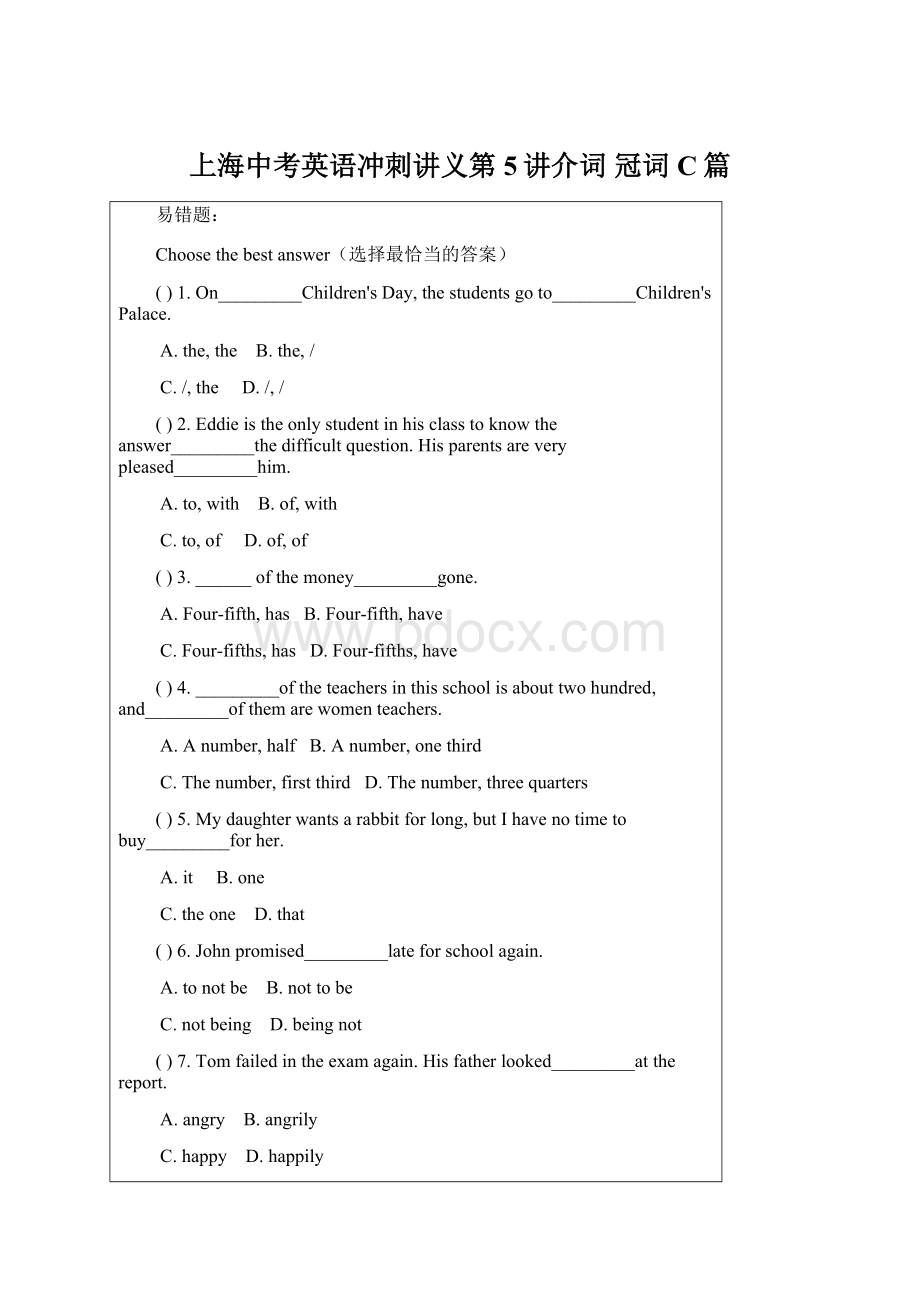 上海中考英语冲刺讲义第5讲介词 冠词 C篇.docx
上海中考英语冲刺讲义第5讲介词 冠词 C篇.docx
- 文档编号:4156544
- 上传时间:2022-11-28
- 格式:DOCX
- 页数:27
- 大小:81.83KB
上海中考英语冲刺讲义第5讲介词 冠词 C篇.docx
《上海中考英语冲刺讲义第5讲介词 冠词 C篇.docx》由会员分享,可在线阅读,更多相关《上海中考英语冲刺讲义第5讲介词 冠词 C篇.docx(27页珍藏版)》请在冰豆网上搜索。

上海中考英语冲刺讲义第5讲介词冠词C篇
易错题:
Choosethebestanswer(选择最恰当的答案)
()1.On_________Children'sDay,thestudentsgoto_________Children'sPalace.
A.the,theB.the,/
C./,theD./,/
()2.Eddieistheonlystudentinhisclasstoknowtheanswer_________thedifficultquestion.Hisparentsareverypleased_________him.
A.to,withB.of,with
C.to,ofD.of,of
()3.______ofthemoney_________gone.
A.Four-fifth,hasB.Four-fifth,have
C.Four-fifths,hasD.Four-fifths,have
()4._________oftheteachersinthisschoolisabouttwohundred,and_________ofthemarewomenteachers.
A.Anumber,halfB.Anumber,onethird
C.Thenumber,firstthirdD.Thenumber,threequarters
()5.Mydaughterwantsarabbitforlong,butIhavenotimetobuy_________forher.
A.itB.one
C.theoneD.that
()6.Johnpromised_________lateforschoolagain.
A.tonotbeB.nottobe
C.notbeingD.beingnot
()7.Tomfailedintheexamagain.Hisfatherlooked_________atthereport.
A.angryB.angrily
C.happyD.happily
()8.Theplotofacomicstripisalwaysfullofactiontokeepthereaders_________.
A.interestB.interested
C.interestingD.interestedly
()9.What______they'vegot!
Nowondertheyareveryhappy.
A.agoodnewsB.quiteafewnews
C.goodnewsD.littlenews
()10.Happybirthday,Alice!
Soyouhave_________eighteenalready.
A.becomeB.turned
C.passedD.grown
()11.Toplantthetree,wemustdig__________
A.athreefootdeephole
B.athree-foot-deephole
C.aholethree-foot-deep
D.athree-feet-deephole
()12.Thephysicsproblemis_________thatone.
A.lesseasierthanB.asdifficultas
C.muchdifficulterthanD.soeasyas
()13.Iwastakingashower_________someoneknockedatthedoor.
A.whenB.while
C.asD.if
()14.Hesaidwhathesawwasamazing,__________?
A.washeB.wasn’the
C.didn’theD.didhe
()15.__________foodiswastedthaniseateninthisdining-room.
A.MuchB.Toomany
C.MuchtooD.More
()16.Theyfeltsoboredthattheywantedtohave_________toread.
A.somethinginterestingB.somethinginterested
C.anythinginterestingD.anythinginterested
()17.Ourschoolisfamousforitsqualityeducation.It_________bothclassroomandoutdooractivities.
A.isconsistedofB.consistsof
C.makesupofD.ismadeof
()18.EverydayEnglish_________ontheradiosincelastyear.
A.wastaughtB.havebeentaught
C.hasbeentaughtD.hastaught
()19.—_________isthepopulationofthetown?
—Over20000.Andathirdofthepopulation_______workersofthecarfactory.
A.What,areB.Howmany,are
C.What,isD.Howmany,is
()20–Couldyoutellme__________?
Imustfindhim.
—Sorry,Ihavenoidea.Buthewasherejustnow.
A.whereTomwasB.wherehasTomgone
C.wherecanIfindTom.D.whereTomis
()21.Canyou_________thebadbehaviorofBilly?
A.getridofB.putupwith
C.keepupwithD.putonwith
()22.ThepeopleinWenchuanneed_________moneytorebuildtheirhometown.
A.alotB.agreatmany
C.alargeamountofD.agreatnumberof
()23.Cantheinformationbestoredinthecomputer?
Whichonehastheclosestmeaningwiththeunderlinedpart?
A.beworkedoutB.bemadeout
C.bekeptD.bepushed
()24.Seeingtheteachercameintotheclassroom,thestudentsstoppedtalkingimmediately.Whichonehastheclosestmeaningwiththeunderlinedpart?
A.intheendB.atpresent
C.atonceD.forthetimebeing
()25.—WouldyoumindifIsmokehere?
—_______Ithinkyou'dbetterdoitoverthere.
A.Certainlynot.B.I'msorry.C.Yes,please.D.No,goahead.
()26.—_________?
—Sheisprettyandslim.
A.WhatdoesLindalooklikeB.What'sLindalike
C.WhatdoesLindalikeD.HowdoesLindalooklike
1-5CACDB6-10BBBCB11-15BBACD16-20ABCAD21-25BCCCB26A
一、专题知识梳理
考点解读
一、介词的概念
介词是一种虚词,不能独立使用。
介词之后一般有名词、动名词或代词(宾格)或相当于名词的其他词类、短语或从句作它的宾语,即构成介词短语。
有些介词是由两个以上的词构成的短语介词,如:
outof(从…中出来),becauseof(因为),awayfrom(距离…),ontopof(在…顶上),eversince(自从…),nextto(在…隔壁),accordingto(根据…),infrontof(在…前方)等。
二、介词分类
地点(位置、范围)介词:
above在…前,about在…附近,across在…对面,after在…后面,against倚着...,along在…近旁,among在…中间,around在…周围,round在….周围,at在…处,before在...前,behind在...后,below低于...,beside在...旁边,between在...之间,by在...旁,down在...下面,from来自...,in在...里面,inside在...里面,near靠近...,of在...之中,on在...上面,outof在...之外,outside在....外面,over在....上方,under在...下方,up在...上面,ontopof在...顶部,infrontof在...前,closeto靠近...,inthemiddleof在...的中间,attheendof在...的末端,等等。
方向(目标趋向)介词:
across横越...,against对抗...,along沿着...,around绕着...,round环绕...,at朝着...,behind向…后面,between…and…从…到...,by路过/通过...,down向…下,for向...,from从/离...,in进入...,into进入...,inside到...里面,near接近...,off脱离/除...,on向...上,outof向...外,outside向....外,over跨过...,past经过/超过...,through穿过...,to向/朝...,towards朝着...,onto到...上面,onto到...上面,awayfrom远离...
时间介词:
about大约...,after在…以后,at在…(时刻),before在…以前,by到…为止,during在…期间,for有…(之久),from从…(时)起,in在(上/下午);在(多久)以后,on在(某日),past过了…(时),since自从…(至今),through贯穿…(期间),till直到…时,until直到…时,to到(下一时刻),eversince从那时起至今,atthebeginningof在...开始时,attheendof在...末,inthemiddleof在...当中,atthetimeof在...时
方式介词:
as作为/当作...,by用/由/乘坐/被...,in用…(语言),like与…一样,on骑(车)/徒(步),通过(收音机/电视机),over通过(收音机),through通过...,with用(材料/工具)、用(手/脚/耳/眼);without没有…
涉及介词:
about关于...,except除了…,besides除了…还...for对于/就…而言,in在…(方面),of…的,有关...,on关于/有关...,to对…而言,towards针对...,with就…而言
其它介词:
【目的介词】for为了...,from防止…,to为了…
【原因介词】for因为...,with由于…,becauseof因为...
【比较介词】as与…一样,like象…一样,than比...,to与…相比,unlike与…不像
【伴随/状态介词】against和…一起(比赛),at在(上班/休息/上学/家,etc.),in穿着…(衣服/颜色),into变成...,on在(值日),with与…一起,有/带着/长着...,without没有/无/不与…一起
三、介词短语
1、作用
介词短语相当于一个形容词或副词,可用作状语、定语和表语。
如:
Themancame
2、位置
介词短语做状语时,如果表示时间/地点,可以放在句首或句尾,如果表示方向/方式/伴随/涉及/原因/目的/比较,一般放在句尾;介词短语作表语时放在连系动词之后;介词短语作定语时,只能放在被修饰的名词之后。
如:
HewantedtofindagoodjobinShanghaithenextyear.(状语)(他想来年在上海找份好工作)/Theysearchedtheroomforthethief.(他们在房间里搜索小偷)/Thelettersareforyou.(表语)(信是给你的)/Haveyouseenacatwithablackheadandfourwhitelegs?
(定语)(你看见一只黑头白腿的猫了吗?
)
四、难点解析
1、this/that/these/those/last/next/a/every/each等词构成的时间短语,前面不用任何介词。
如:
EveryyeartravellersfromabroadcometovisitPingyao.(每年都有国外的游客来游览平窑镇)/Hehadabadcoldthatweek.(那个星期他患重感冒)
2、for有时用来引出动词不定式的逻辑主语,常翻译成“对于…而言”。
如:
It’stoohardformetofinishtheworkinonlyonehour.(让我在区区一个小时内完成这项工作太难了)/Thehouseisbigenoughfor10mentolivein.(房子够大的可以容10个人住)
3、of有时用来表示后面的人物正好是前面的表语的逻辑主语。
如:
It’sverynice/kindofyoutodoso.(你这么做真是太好了)
4、介词有时会与它的宾语分离,而且宾语前置。
1当宾语是疑问词时。
Whoareyoutalkingabout?
(你们在谈论谁?
)
2宾语在从句中当连接词时。
Hehasayoungerbrotherwhohemusttakegoodcareof.(他有一个需要他照顾的小弟。
)/Doyouknowwhoourteacheristalkingwithoverthere?
(你知道我们的老师在那边和什么人谈话吗?
)
3动词不定式作定语且该动词为不及物动词,后面有介词。
Ifinallyfoundachairtositon.(我最终找到了一张椅子坐。
)
5、记住一些固定词组:
arriveat/in(到达…),onfoot(步行),not…atall(根本不),tothenorthof(在…以北),intheeastof(在…的东部),inthenight(在夜间),atnight(在晚上),beafraidof(害怕…),befullof(充满/装满….),befilledwith(充满/装满….),begood/badfor(对…有益/有害),bemadeof(由…做成),bemadefrom(由…制造),playwith(玩耍……),lookoutof(朝…外面看),attheendof(在…末梢/结束时),bytheendof(不迟于…/到…末为止),withthehelpof或withone’shelp(在…的帮助下),lookafter(照料…),lookfor(寻找…),onabike(=bybike)骑车,helpsb.with(帮某人做…),geton(well)with(与某人相处[融洽]),等等。
theanswerto………的答案
thekeyto………的答案/钥匙
thewayto…去……的路
thetrip/journeyto…去……的旅行
bytheway顺便说;顺便问一下
ontheway(to)…在去……的路上
intheway在路中间(挡路)
inthisway用这种方法
between在两者之间或三者(强调两两之间的差别或关系)
among在三者或三者以上之中(不强调差别或之间的关系)
buysth.forsb.makesth.forsb.
raisesth.forsb.providesth.forsb.
givesth.tosb.showsth.tosb.
offersth.tosb.lendsth.tosb.
6、某些介词的用法辨析:
⑴时间或地点介词in、on、at的用法区别:
表示时间时,in表示在一段时间里(在将来时句子中则表示在一段时间之后),on表示在具体的某一天或者某天的上下午等,at表示在某个时刻或者瞬间;表示地点时,in表示在某个范围之内,on表示在某个平面上或与一个面相接触,at则表示在某个具体的场所或地点。
如:
HewasbornonthemorningofMay10th.(他出生于五月十日的早晨)/Iusuallygetupat7:
00inthemorning.(我通常在早上的七点钟起床)/Hisglassesarerightonhisnose.(他的眼镜就架在他的鼻子上)/Heisatthecinemaatthemoment.(此刻他正在电影院)
⑵after与in表示时间的用法区别:
“after+(具体时刻/从句)”表示“在…时刻之后”常用于一般时态;“in+(一段时间)”表示“在(多久)之后”,常用于将来时态。
如:
Hesaidthathewouldbehereafter6:
00.(他说他六点钟之后会来这儿)/MyfatheriscomingbackfromEnglandinaboutamonth.(我父亲大约一个月以后从英国回来)
⑶since与for表示时间的用法区别:
“since+(具体时刻/that-从句)”表示“自从…起一直到现在”,“for+(一段斶间)”表示“总共有…之久”,都常用于完成时态;如:
UncleLihasworkedinthisfactorysince1970.(李叔叔自从1970年起就在这家工厂工作了)/UncleLihasworkedinthisfactoryforover30years.(李叔叔在这家工厂已经工作了30多年)
⑷by、in与with表示方式的用法区别:
都可以表示“工具、手段”,但是by主要表示“乘坐”某个交通工具或“以……方式”,在被动句中可以表示动作的执行者;in表示“使用”某种语言/文字,with表示“使用”某个具体的工具、手段。
如:
Weseewithoureyesandwalkwithourfeet.(我们用眼睛看东西,用双脚走路)/Pleasewritethatarticle(文章)inEnglish.(请你用英语写那篇文章)/Let’sgotothezoobytaxi.(我们打的去动物园吧。
)/ItwaswrittenbyLaoShe.(那是老舍写的)
⑸about与on的用法区别:
都可以表示“有关…”,但是about的意义比较广,而on主要表示“有关…(专题/课程)”。
如:
TomisgoingtogiveatalkonthehistoryofAmerica.(汤姆要作一个美国历史的报告)/Theyareveryexcitedtalkingaboutthecomingfieldtrip.(他们兴致勃勃地谈论着即将来到的野外旅游)
⑹through与across、over的用法区别:
through指“穿过事物内部…(门洞/人群/树林/窗口/玻璃等)”;across表示横穿事物的表面(如街道、河流等);over指跨越在物体的正上方(河上方有座桥)”,表示“翻过…”时也用over.如:
Justthenarat(鼠)ranacrosstheroad.(就在那时一只老鼠跑过路面)/Thereisabridgeovertheriver.(河上有座桥)/Theyclimbedoverthemountainandarrivedthereaheadoftime.(他们翻过大山提前到达了那里)/Thevisitorswentthroughabiggateintoanotherpark.(参观者们穿过一个大门来
- 配套讲稿:
如PPT文件的首页显示word图标,表示该PPT已包含配套word讲稿。双击word图标可打开word文档。
- 特殊限制:
部分文档作品中含有的国旗、国徽等图片,仅作为作品整体效果示例展示,禁止商用。设计者仅对作品中独创性部分享有著作权。
- 关 键 词:
- 上海中考英语冲刺讲义第5讲介词 冠词 C篇 上海 中考 英语 冲刺 讲义 介词
 冰豆网所有资源均是用户自行上传分享,仅供网友学习交流,未经上传用户书面授权,请勿作他用。
冰豆网所有资源均是用户自行上传分享,仅供网友学习交流,未经上传用户书面授权,请勿作他用。


 《雷雨》中的蘩漪人物形象分析 1.docx
《雷雨》中的蘩漪人物形象分析 1.docx
